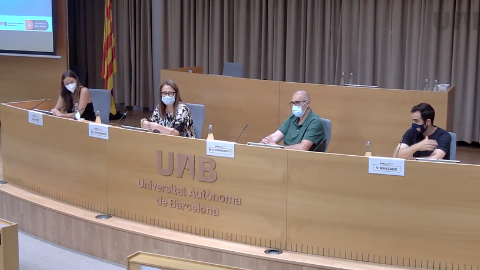Conference on community engagement in the university sector

On 15 June last, a conference was held on the Community Engagement (CE) methodology in the university sector and the options it offers in the implementation of social commitment projects.
23/06/2021
On Tuesday 15 June, the Second CE Conference was held, organised by Fundació Autònoma Solidària and the CE Office of UAB (Autonomous University of Barcelona), with the support of the Barcelona City Council and UAB. The purpose of this event was to provide in-depth information about the CE methodology in the university sector and provide tools to enable teachers, organisations and students to put it into practice.
The Conference was divided into three parts. The first was a virtual session for the co-creation of CE projects targeted at teachers, social and/or environmental organisations and public centres. In the second part, prizes were awarded for the best End-of-Degree projects mentioning CE, sustainable development and global justice. The conference ended with a round table on what it means to take part in an End-of-Degree project from the perspective of organisations, students and teachers. The last two parts were held at the Conference Room of the Administrative Building and were shown on the UAB You Tube Channel.
The project co-creation session started at 10 a.m. After a brief welcome message by Maria Valdés, the Vice-Chancellor for Studies and Educational Innovation at UAB, an explanation was provided about the functioning of the session and Professor José Luis Lalueza explained how CE is understood at UAB through the website. Then the 68 participants were divided up into 5 rooms, each corresponding to a different knowledge area and participatory activities were organised by the members of the CORE-UAB network and the permanent CE committee with a view to enabling teachers and organisations to work together based on the pillars of a CE project such as detecting needs, associated learning, proposed interventions or ways in which to coordinate and channel the proposals. One hour later, the participants in all the rooms met together to discuss the work completed and provide information about UAB’s different lines of interaction with CE.
At 12 p.m., Maria Valdés welcomes the persons taking part in the prize-giving ceremony for the End-of-Degree project mentioning CE. Maria Monzó, a member of the technical staff of Barcelona City Council’s Directorate for Global Justice and International Cooperation, and Jordi Prat, the Director of Fundació Autònoma Solidària (FAS), also participated. They explained how the conference would be organised and thanked the institutions and people who had given their support and made it possible to hold the conference.
Then the prize-winning End-of-Degree projects mentioning CE were announced by faculties and the winners were able to say a few words about the importance of using this methodology to implement their projects and studies. Lastly, the winning projects in each knowledge area category were announced, with each receiving €250.
Prizes were awarded to 5 End-of-Degree projects by the students Victor Manzano Jiménez (Biosciences), Carles Morales Vilches and Yasmina Ben Hammou (Sciences), Iris Escusol Manzano (Education Sciences), Míriam Barajas Sousa (Psycology) and Xènia Sala Pareta (Veterinary Sciences). The 3 winning projects, by knowledge areas, were those of Victor Manzano (in the Sciences, Biosciences and Technologies area), Miriam Barajas (in the Health Sciences area) and Iris Escusol (in the Social and Legal Sciences area).
Finally, a round table was held, run by Maria Monzó, with 3 different viewpoints about what it means to carry out a CE project.
Miguel Ángel Franconetti, from Fundació Privada Pere Closa, an organisation which cooperated in an interdisciplinary End-of-Degree project this year and last year, said that the CE methodology is a method that enables community and social action areas to be integrated with the university sector.
Maria Isabel Fernández, the coordinator of the Nursing Degree End-of-Degree project representing CE in the faculty of Medicine and tutor of 2 End-of-Degree projects on CE last year and 3 this year, spoke about the successful experience of the Degree projects in CE methodology that had been approved by the Ethics Committee of Vall d’Hebron and were currently under way.
Víctor Manzano, an Environmental Biology graduate and winner of the prize for the best End-of-Degree project in the Biosciences faculty, said that the CE experience had helped him develop both as a person and as a professional.
The conference ended with a few words by Maria Valdés who reiterated that the CE methodology should be one of the basic elements in future education and that CE was essential in a new post-pandemic setting.